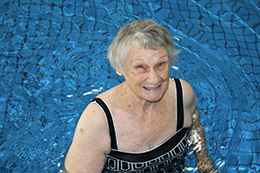05 September 2016
 With fewer babies being born and more people living longer the Australian population is ageing.
With fewer babies being born and more people living longer the Australian population is ageing.
Changes to the context within which aged care services are now provided and future challenges that need to be addressed as the Australian Government implements its reform agenda and other impacts of demographic, economic and social transformation become apparent, means ageing is an issue in which everybody has an interest.
There is an increasing recognition among South Australian policy makers and key government instrumentalities, such as the Economic Development Board, that the State’s ageing population will be a significant economic driver.
The University of South Australia prides itself on being the University of Enterprise and is committed to delivering innovative and sustainable research solutions to some of the most pressing needs of society including the changes taking place across Australia with respect to older people.
UniSA Business School’s Ageing in South Australia 2016: Insights from the aged care sector report, which contains findings from the project Ageing in South Australia: the attitudes, expectations and strategies of service providers, was launched by the Minister for Ageing, the Hon. Zoe Bettison today.
The data presented in the report represents a unique set of insights into South Australia’s aged care sector at a time when it is preparing for, and experiencing, change.
Deputy Vice Chancellor and Vice President of Research and Innovation, Professor Tanya Monro, says UniSA’s Age Friendly World research is intrinsically interdisciplinary and the Ageing in South Australia 2016 research project is an example of productive and end-user focussed research.
“I am immensely proud to see our researchers working with the South Australian aged care industry to provide a snapshot of the sector in 2016,” Prof Monro says.
“This report acknowledges the changes taking place across Australia with respect to older citizens including the structural ageing of the population, the introduction of Consumer Directed Care (CDC) at the national level, the impact of changes to government income support and shifts in the life course after the age of 60.
“Many of these changes have the potential to exert a disruptive impact on the aged care sector so it is pleasing that a number of our talented researchers are working to provide a unique set of insights into South Australia’s aged care sector.”
Rising researchers, Dr Braam Lowies and Dr Xin Deng, were both central members of the Ageing in South Australia 2016 team.
A financial behaviour expert, Dr Lowies says the research emphasises that much more needs to be done in the area of financial literacy for older Australians and that there is scope for aged care providers to more active in this and other areas.
“Our understanding of ageing in South Australia is often limited by a very partial evidence base on the attitudes, expectations and perspectives of older people,’ Dr Lowies says.
“Their voices are often silenced by a combination of factors including limited financial resources, a tendency for providers to consult to older Australians rather than with older Australians, the eloquence of the aged care provider sector and the critical significance of changing Australian Government policies for older people.”
Labour market and finance sector specialist, Dr Xin Deng says that while the aged care workforce has been steadily increasing over time as the industry has expanded there are worrying signs.
“Labour shortages in aged care are so much of a concern that the term ‘crisis’ is frequently used to describe the status of the workforce in this sector,” Dr Deng says.
“Rising demand as a result of a fast growing ageing population, relatively low salaries and an ageing workforce contribute to the difficulties the aged care sector has attracting and retaining workers.”
Aging in South Australia 2016
Jane Andrew, Andrew Beer, Xin Deng, Marie Feo, Wendy Lacey, Braam Lowies, David Parker, Matthew Rofe and Ying Zhu
The report examines the attitudes, expectations and strategies of agencies working in aged care in South Australia in 2016. It sets out to document the business conditions and perceived opportunities affecting the sector at a time of considerable transition, with a view to establishing a baseline of information that permits the monitoring of change over time, and helps inform both business growth and the formation of government policy.
The data presented in this report represents a unique set of insights into South Australia’s aged care sector at a time when it prepares for, and experiences, change. The data presented here was collected from February to May 2016 via an on-line survey sent to the CEOs of identifiable providers of aged care services in the state.
This data collection will be repeated over the coming years to provide a snapshot of both change and emerging issues and accompanies research into the perspectives of aged care consumers in South Australia in 2016.
Media contact: Katrina McLachlan mobile: 0414972537 email: katrina.mclachlan@unisa.edu.au




